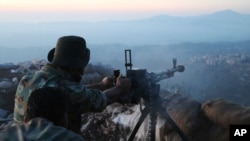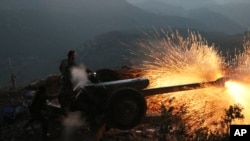Russia appears to have at least doubled the number of military personnel on the ground in Syria ahead of an expected pro-regime offensive to retake the city of Aleppo.
“It is coming,” said a U.S. official of an Aleppo offensive. What is unclear is whether Russian ground forces will take part.
The latest U.S. estimates put the total number of Russian troops at about 3,000, according to an official who spoke to VOA on the condition of anonymity.
A second U.S. official said the number of Russian military personnel could be even higher.
“They definitely number in the thousands,” the second official said. “It’s obvious to make that conclusion based on the number of assets there.”
Both officials emphasized the larger estimates included maintenance staff and others needed to maintain Russian military operations.
They also noted Russia has increased the number of military cargo flights to Syria to as many as four per day, twice as many as during the initial military buildup.
Still, there is the question of how and where Russia is housing a growing force.
'Lots of capability'
Until recently, most of the Russian ground force, including 500 naval infantrymen, has been based at the Bassem al-Assad airbase near Latakia. But U.S. defense and intelligence officials have said Russia only has enough modular housing at the airbase for up to 2,000 troops.
One possibility is a northward expansion.
Satellite images released last month by IHS Jane’s showed what appeared to be Russian construction at the Istamo weapons storage complex and the Al-Sanobar military complex, both to the north of the airbase.
Images of Al-Sanobar also showed the presence of tents, which officials and analysts say would likely be used to house any expeditionary forces.
Just last week, U.S. Ambassador to NATO Douglas Lute warned of such an expeditionary force, saying Moscow had sent a “battalion-size ground force,” about 800 to 1,000 troops, to Syria along with advanced tanks, artillery and long range rockets.
And while most of the Russian effort in Syria has, until now, been concentrated on the use of air power, the expectation is the new Russian troops and equipment will not be idle for long.
“They have a lot of capability and a lot of firepower that they’ve brought into Syria,” one of the U.S. officials told VOA. “And they’re using it all.”
Ground campaign coming
Word of the Russian build-up follows the opening salvos of a ground campaign in which forces loyal to Syrian President Bashar al-Assad have teamed with Iran’s Revolutionary Guard Corps, Hezbollah fighters and Shi’ite militias from Iraq, Afghanistan and Pakistan to battle rebel forces along a northward line, extending from the cities of Homs and Hama to Idlib.
It is an operation that has involved upwards of 10,000 fighters and is expected to soon include the key city of Aleppo, where Iranian forces and Hezbollah fighters have been massing for days.
U.S. military and intelligence officials describe the pro-Assad troop build-up around Aleppo only as fluid, though others have said the number of pro-regime forces is likely in the thousands.
“They've especially played up their deployments to the besieged Shia towns of Nubl and Zahra,” said Phillip Smyth, a researcher at the University of Maryland and the Washington Institute for Near East Policy who tracks the online activity of Shi’ite militias.
Many of the pro-Assad forces are battle-hardened, some with savage reputations.
“Kata'ib al-Imam Ali, an Iranian-backed Iraqi Shia militia which gained recognition due to its brutality in Iraq has also claimed to have positioned forces in Aleppo,” Smyth said.
Putin chess game
Still, U.S. defense and intelligence officials point out the Russian-directed advance, for all its manpower and firepower, has not met with easy success.
“Many of the forces that remain in key areas are battle-hardened and experienced fighters,” a U.S. intelligence official warned last week. “This includes not only ISIL, but the moderate opposition, (Jabhat al) Nusrah, and Ahrar al-Sham.”
Opposition groups have also claimed success in some of the initial confrontations, bragging of using U.S.-made TOW anti-tank missiles to destroy regime tanks.
But some former officials warn the U.S. can ill afford to write-off the strategy being employed in Syria by Russian President Vladimir Putin.
“Putin has already taken advantage,” said retired U.S. Air Force Lt. Gen. David Deptula, who helped lead previous U.S. air campaigns over Iraq and Afghanistan. “It's shown that not only can Putin walk and chew gum at the same time, but he can also play chess.”





